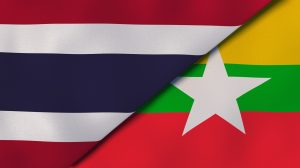Thailand has reportedly invited interested members of the Association of Southeast Asian Nations (ASEAN) to participate in a consultative meeting aimed at addressing the political crisis in Myanmar.
According to a report published Sunday by Thai PBS, the “open-ended consultative meeting on the situation in Myanmar” will be held on December 22. The article was sourced to a single “informed source,” presumably from within the Thai Foreign Ministry, who described the meeting as “a Thai initiative to update and exchange views informally among colleagues interested in and affected by the Myanmar quagmire.”
The ultimate goal of the meeting, the article paraphrased, will be “to synergize [the nations’] efforts to return normality to Myanmar and fulfill the inspirations of its people.”
It is unclear from the wording of both the article and the source’s comments exactly which nations will attend. Thai PBS quoted the source as saying that “Thailand’s neighboring countries” – i.e. Cambodia and Laos – had confirmed their attendance, given that they “are directly and indirectly impacted by the crisis in Myanmar.” But the source also reportedly did not divulge exactly how many ASEAN member states would join, which seems to imply that others might participate.
More clear are the meeting’s likely limitations. Unlike recent high-level ASEAN meetings, the military junta’s foreign minister, Wunna Maung Lwin, will take part in the proceedings. This alone guarantees that the meeting will produce little progress on the fundamental political conflict in Myanmar: the struggle between the military administration on the one hand and the opposition National Unity Government and its allies on the other. Added to this is the fact that the likely attendees have taken accommodating lines toward the military’s February 2021 coup and the junta’s ensuing use of violence.
This is of course also true of Thailand. It makes sense for Bangkok to play a more active role in addressing the conflicts in Myanmar, given that the two nations share a 2,416-kilometer border that has often seen the backwash from conflict inside Myanmar.
But Thailand’s unusual exposure to Myanmar’s post-coup turmoil has not translated into a particularly robust policy toward the coup government. While maritime Southeast Asian nations, particularly Malaysia, Indonesia, and Singapore, have tried to steer ASEAN into pushing the junta to adhere to the Five-Point Consensus (or perhaps junk it altogether in favor of a different approach), Thailand has advocated a quieter diplomatic approach. It has remained muted in the face of the Myanmar military’s brutal crackdowns on anti-coup protesters, and the destabilization of regions directly bordering Thailand.
While there is a time and place for pragmatic engagement, any meeting in which the military junta is represented stands no chance of improving the situation in the country, and could very well worsen it. Whether or not it is intended, in convening its own meeting on Myanmar, however informal and “open-ended,” it is hard not to see Thailand’s move as a rebuke of the harder line that incoming ASEAN chair Indonesia is likely to take toward the bloc’s perennial problem member in 2023.

































